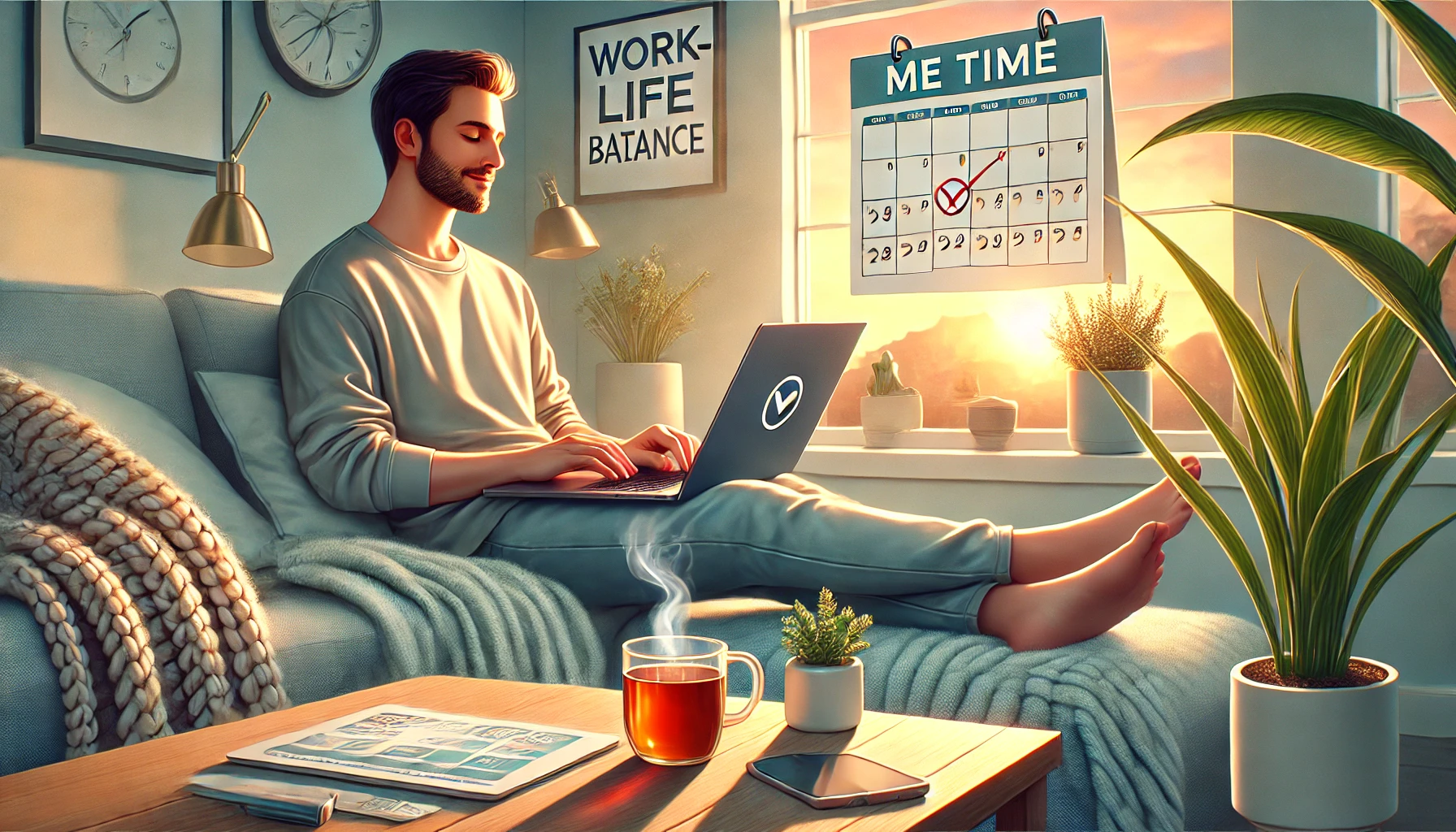The pressure to hustle is everywhere.
Deadlines, meetings, side projects, social obligations — all competing for your time and energy.
But here’s the truth: constantly pushing without rest isn’t sustainable.
Work-life balance isn’t a luxury — it’s a necessity for your mental health, physical wellbeing, relationships, and long-term success.
In this article, you’ll discover why balance matters, what it actually looks like (hint: it’s different for everyone), and how to start creating space for both ambition and rest in your daily life.
1. What Is Work-Life Balance, Really?
Work-life balance isn’t about perfectly splitting your time 50/50.
It’s about:
- Having time for both your personal and professional priorities
- Being present where you are — without guilt or distraction
- Preventing burnout by protecting your energy
True balance means you’re not sacrificing one part of your life to keep another afloat.
2. Why Work-Life Balance Is Essential
When you don’t have balance, you may notice:
- Constant fatigue or irritability
- Trouble sleeping or switching off
- Decreased creativity and motivation
- Strained relationships
- Physical or mental health issues
When you do have balance:
- You focus better
- You feel more energized and calm
- You make clearer decisions
- You enjoy your work and your time off more fully
Balance makes everything — even your productivity — more sustainable.
3. The Cost of Burnout
Without boundaries, burnout creeps in slowly:
- You feel numb, detached, or unmotivated
- Tasks feel heavier and slower
- Joy disappears from things you used to love
Burnout doesn’t just affect you — it affects your performance, your team, your family, and your health.
Work-life balance is one of the most powerful ways to prevent burnout before it starts.
4. Balance Looks Different for Everyone
Your version of balance might not look like someone else’s.
For you, it might be:
- Logging off at 6 PM every day
- Having flexible hours to pick up your kids
- Taking Fridays off for personal projects
- Scheduling solo time to recharge
The key is to define what balance means to YOU — and build around that.
5. Create Clear Boundaries Between Work and Life
Some ideas:
- Set a daily “shutdown” time (and stick to it)
- Use separate devices or profiles for work and personal use
- Avoid checking emails or Slack after hours
- Block off weekends or evenings for rest and connection
When you protect your personal time, you increase your energy during work time.
6. Prioritize Tasks — Not Just Time
Balance isn’t just about how many hours you work. It’s about what you’re doing with those hours.
Try:
- Focusing on your top 1–3 priorities each day
- Delegating or eliminating low-impact tasks
- Saying no to non-essential meetings or requests
Productivity without purpose leads to burnout.
Clarity leads to balance.
7. Build Breaks Into Your Day
Rest isn’t earned — it’s required.
- Take short breaks every 60–90 minutes
- Eat away from your screen
- Go for a walk, breathe deeply, stretch
- Pause for 10 minutes of quiet between tasks
Breaks restore energy, prevent overwhelm, and make you more effective — not lazy.
8. Make Time for What Fuels You
Work-life balance isn’t just about avoiding stress — it’s about creating joy.
So ask yourself:
- What recharges me?
- What relationships or activities make me feel alive?
- What have I been putting off in my personal life?
Then schedule it — like you would a meeting. Because you are just as important.
9. Talk About Balance With Your Team or Boss
Balance is easier when it’s supported by your environment.
Try:
- Setting availability hours
- Suggesting async work when possible
- Being honest about your capacity
- Modeling healthy boundaries for others
When teams talk openly about balance, everyone benefits.
10. Balance Isn’t Static — It’s a Practice
Some weeks will be more work-heavy. Others, more rest-heavy. That’s normal.
The goal isn’t perfection. It’s awareness + intentional correction.
Each day, ask:
- What do I need today — more focus or more recovery?
- Am I honoring my needs, not just my deadlines?
- How can I make a small shift toward better balance right now?
Protect Your Energy. Live Your Life.
You can be ambitious and rested.
You can pursue excellence and protect your peace.
You can do great work without losing yourself in it.
Work-life balance isn’t about doing less — it’s about living more intentionally.
So pause. Breathe. Reconnect.
Because when you take care of you, everything else flows better too.

Very important it. Many thanks Paulo. I see myself with your post. 🙌🏽
thank you